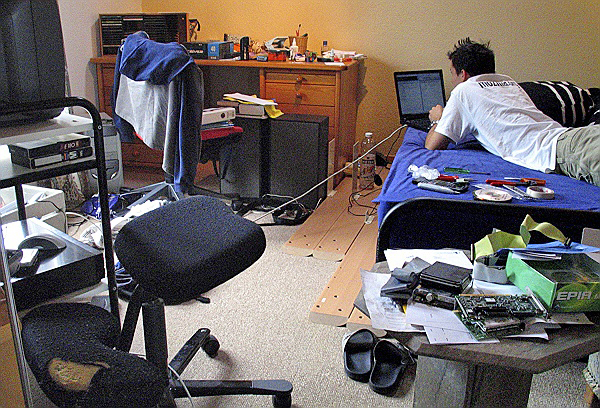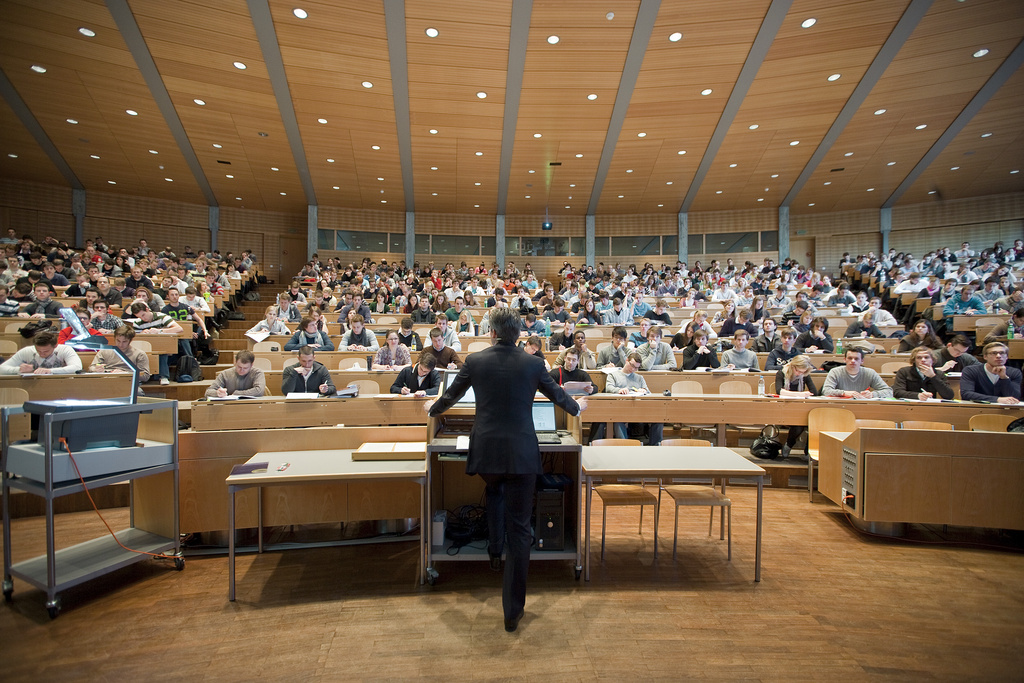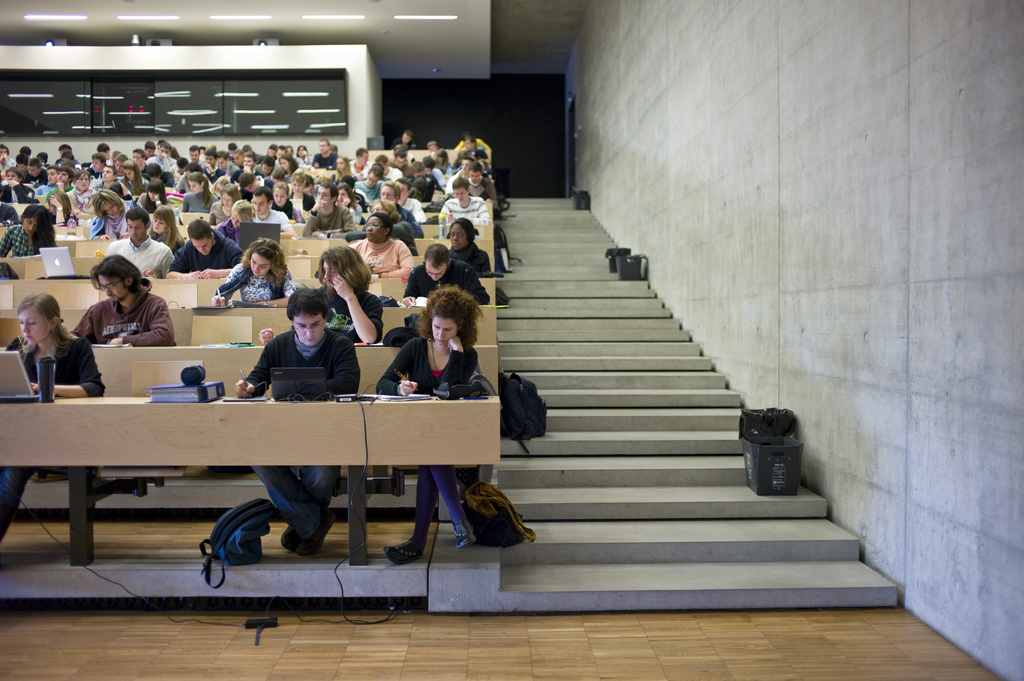Students struggle to find Swiss digs

New university students in Switzerland are facing a chronic housing shortage as they prepare to start their academic year.
Specialists say the problem is getting worse, especially in Zurich, Geneva and Lausanne. In Lausanne a group of new foreign students recently slept several weeks under canvas at a local campsite before being offered a roof over their heads.
Claude Michel, owner of the Vidy campsite in Lausanne, close to Lake Geneva and the city’s two universities, is relieved.
“Thanks to local solidarity they seem to have all found somewhere to live after coverage by the local press,” Michel told swissinfo.ch on Wednesday.
Just days earlier some 20 students were staying at his lakeside campsite while they desperately searched for accommodation in Lausanne.
“I don’t know what happened this year,” said the campsite manager. “Every year we have a few students camping here at the start of term, but we’ve never had so many.”
University officials say it is still too early to say precisely how many students will be homeless come the start of term in October. But they all agree that the situation seems to be getting worse.
“There is a growing shortage of student accommodation in Switzerland,” bemoaned Thomas Leibundgut, co-president of the committee on social affairs at the Association of Swiss Students.
New arrivals at Basel, which has just over 11,000 students, tend to be slightly better off as there is more subsidized housing available, followed by Bern, said Leibundgut.
But in Lausanne, Zurich and Geneva – home to tens of thousands of students, international organisations and multinationals and spiralling rental prices – students find themselves increasingly squeezed.
Leibundgut said the deteriorating situation had surprised him and the student association.
“We have seen the problem coming for a long time now but we never assumed that people would end up staying in tents and caravans,” he commented.
Full up
Some 18,870 students were registered at Lausanne University and the Federal Institute of Technology in the city last year. Around 2,500 new students are expected this October, of whom two-thirds will stay at their parents and one-third look for their own digs.
But the 1,700 student rooms available in Lausanne are completely full up and there is an impressive waiting list, explained Gilberte Isler, head of socio-cultural affairs for both institutions.
“So we are looking for people with a room to let or share an apartment to contact us,” she told swissinfo.ch.
Geneva presents a similar picture.
“It’s getting tougher,” said Françoise Demierre, head of Geneva University’s accommodation service.
The university has increased its housing stock by 20 per cent, but small blocks of student flats have closed, and demand for rooms has increased by 10 to 15 per cent, she explained.
Geneva has 2,000 places in its residences for 14,890 students, and 3,000 new students are expected this term. In Zurich there are some 800 new incoming students each semester to join the ranks of the 25,800 studying at Zurich University and 16,200 at the Federal Institute of Technology, but only 400 student beds are available for the newcomers.
Overseas students
Specialists say part of the growth in demand is due to foreign students. According to the Federal Statistics Office, the number of foreigners starting bachelor’s degrees increased by around eight per cent per year from 1997 to 2008. By 2008, 19 per cent came from abroad.
Overseas students are attracted by Swiss universities’ good reputations and study conditions. Another factor behind the increase is the Bologna reform, which harmonises qualifications across Europe and encourages mobility.
But once overseas students arrive they are pretty much left to their own, said Leibundgut.
“They are shocked as they always hear that Switzerland is a beautiful, rich country but when they arrive they realize that it’s not as easy as people told them and they run into problems,” he noted.
Land problem
Action is on the horizon to increase the number of student beds and awareness of the chronic housing shortage is growing among politicians, said Leibundgut.
But a wider view is needed that looks at the “whole student package” of accommodation, rising tuition fees and health insurance and limited student grants, he said.
New residences, renovations and flat-buying initiatives are planned or underway in Lausanne, Geneva and Zurich over the next two to three years. But they remain drops in the ocean.
“Money exists to build,” said Isler. “The problem is finding the land. Certain communes are not interested in housing students as they don’t pay taxes.”
There was a big increase between 1997-2008 (+8% per year) in foreign students beginning their bachelor or pre-Bologna degree studies in Switzerland.
This boost is expected to continue in the next 2-3 years.
Also many might stay on for masters, implying an increase in total number of foreign students in the next 2 years.
For the master degrees, the Federal Statistics Office does not know whether there is a real trend or the increase is due to structural changes linked to the Bologna process.
There have been 18-20% foreigners starting masters in the past five years.
This actually means a very large increase as in 2004 it was 20% of 3,500 people and in 2008 it was around 20% of 10,000 people.
It could be that the large increase of foreign students followed the increase in masters offered by Swiss universities under the Bologna process.
In that case, a huge rise would not be expected in the next years.
For doctorates there has been a 30-year trend of high numbers of foreign students.
In 2008 49% of people starting their PhDs were from abroad.
An overall future rise is difficult to predict as it could depend on political and administrative decisions.
(Source: Jacques Babel, Federal Statistics Office)
While many agree that overseas students help boost diversity and quality, a debate is raging over whether quotas should be introduced or fees raised to stem costs.
In a recent article in the NZZ am Sonntag newspaper, the directors of St. Gallen University and the Federal Institute of Technology, Zurich, complained of having too many foreign students who did not have the appropriate academic level.
This puts an added burden on staff and infrastructure, they claimed.
One out of four masters courses is taken by an overseas student, which could rise to one in three in the coming years.
The most highly sought after courses were engineering, economics and sciences.
They propose to restrict access to masters courses.
But universities at Geneva and Lausanne reject this idea, describing it as a “selective, elitist” measure.

In compliance with the JTI standards
More: SWI swissinfo.ch certified by the Journalism Trust Initiative















You can find an overview of ongoing debates with our journalists here . Please join us!
If you want to start a conversation about a topic raised in this article or want to report factual errors, email us at english@swissinfo.ch.